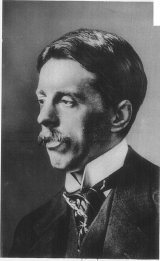Paris Nights and Other Impressions of Places and People Page #17
Enoch Arnold Bennett (27 May 1867 - 27 March 1931) was an English writer. He is best known as a novelist, but he also worked in other fields such as the theatre, journalism, propaganda and films. Bennett was born in a modest house in Hanley in the Potteries district of Staffordshire. Hanley was one of the Six Towns that were joined together at the beginning of the 20th century as Stoke-on-Trent and are depicted as "the Five Towns" in some of Bennett's novels. Enoch Bennett, his father, qualified as a solicitor in 1876, and the family moved to a larger house between Hanley and Burslem.
- Year:
- 1913
- 106,046 Views
***** Walking home, I was attracted, within a few hundred yards of the Opéra, by the new building of the Magasins du Printemps. Instead of being lighted up and all its galleries busy with thousands of women in search of adornment, it stood dark and deserted. But at one of the entrances was a feeble ray. I could not forbear going into the porch and putting my nose against the glass. The head-watchman was seated in the centre of the ground-floor chatting with a colleague. With a lamp and chairs they had constructed a little domesticity for themselves in the middle of that acreage of silks and ribbons and feathers all covered now with pale dust-sheets. They were the centre of a small sphere of illumination, and in the surrounding gloom could be dimly discerned gallery after gallery rising in a slender lacework of iron. The vision of Bagdad had been inexpressibly romantic; but this vision also was inexpressibly romantic. There was something touching in the humanity of those simple men amid the vast nocturnal stillness of that organism--the most spectacular, the most characteristic, the most spontaneous, and perhaps the most beautiful symbol of an age which is just as full of romance as any other age. The human machine and the scenic panorama of the big shop have always attracted me, as in Paris so in London. And looking at this particular, wonderful shop in its repose I could contemplate better the significance of its activity. What singular ideals have the women who passionately throng it in the eternal quest! I say “passionately,” because I have seen eyes glitter with fierce hope in front of a skunk boa or the tints of a new stuff, translating instantly these material things into terms of love and adoration. What cruelty is hourly practised upon the other women who must serve and smile and stand on their feet in the stuffiness of the heaped and turbulent galleries eleven hours a day six full days a week; and upon the still other women, unpresentable, who in their high garrets stitch together these confections! And how fine and how inspiriting it all is, this fever, and these delusive hopes, and this cruelty! The other women are asleep now, repairing damage; but in a very few hours they will be converging here in long hurried files from the four quarters of Paris, in their enforced black, and tying their black aprons, and pinning on their breasts the numbered discs which distinguish them from one another in the judgment-books of the shop. They will be beginning again. The fact is that Bagdad is nothing to this. Only people are so blind. LIFE IN LONDON--1911 I--THE RESTAURANT You have a certain complacency in entering it, because it is one of the twenty monster restaurants of London. The name glitters in the public mind. “Where shall we dine?” The name suggests itself; by the immense force of its notoriety it comes unsought into the conversation like a thing alive. “All right! Meet you in the Lounge at 7.45.” You feel--whatever your superficial airs--that you are in the whirl of correctness as you hurry (of course late) out of a taxi into the Lounge. There is something about the word “Lounge”. . .! Space and freedom in the Lounge, and a foretaste of luxury; and it is inhabited by the haughty of the earth! You are not yet a prisoner, in the Lounge. Then an official, with the metallic insignia of authority, takes you apart. [Illustration: 0133] He is very deferential--but with the intimidating deference of a limited company that pays forty per cent. You can go upstairs--though he doubts if there is immediately a table--or you can go downstairs. (Strange, how in the West-End, when once you quit the street, you must always go up or down; the planet’s surface is forbidden to you; you lose touch with it; the ground-landlord has taken it and hidden it-) You go downstairs; you are hypnotised into going downstairs; and you go down, and down, one of a procession, until a man, entrenched in a recess furnished to look like a ready-made tailor’s, accepts half your clothing and adds it to his stock. He does not ask for it; he need not; you are hypnotised. Stripped, you go further down and down. You are now part of the tremendous organism; you have left behind not merely your clothing, but your volition; your number is in your hand. Suddenly, as you pass through a doorway, great irregular vistas of a subterranean chamber discover themselves to you, limitless. You perceive that this wondrous restaurant ramifies under all London, and that a table on one verge is beneath St. Paul’s Cathedral, and a table on the other verge beneath the Albert Memorial. All the tables--all the thousands of tables--are occupied. An official comes to you, and, putting his mouth to your ear (for the din is terrific), tells you that he will have a table for you in three minutes. You wait, forlorn. It reminds you of waiting at the barber’s for a shave, except that the barber gives you an easy-chair and a newspaper. Here you must stand; and you must gather your skirts about you and stand firm to resist the shock of blind waiters. Others are in your case; others have been waiting longer than you, and at every moment more arrive. You wait. The diners see you waiting, and you wonder whether they are eating slowly on purpose.... At length you are led away--far, far from the pit’s mouth into a remote working of the mine. You watch a man whisk away foul plates and glasses, and cover offence with a pure white cloth. You sit. You are saved! And human nature is such that you feel positively grateful to the limited company.. . . ***** You begin to wait again, having been deserted by your saviours. And then your wandering attention notices behind you, under all the other sounds, a steady sound of sizzling. And there fat, greasy men, clothed and capped in white, are throwing small fragments of animal carcases on to a huge, red fire, and pulling them off in the nick of time, and flinging them on to plates which are continually being snatched away by flying hands. The grill, as advertised! And you wait, helpless, through a period so long that if a live cow and a live sheep had been led into the restaurant to satisfy the British passion for realism in eating, there would have been time for both animals to be murdered, dismembered, and fried before the gaze of a delighted audience. But fear not. The deity of the organism, though unseen, is watching over you. You have not been omitted from the divine plan. Presently a man approaches with a gigantic menu, upon which are printed the names of hundreds of marvellous dishes, and you can have any of them--and at most reasonable prices. Only, you must choose at once. You must say instantly to the respectful but inexorable official exactly what you will have. You are lost in the menu as in a labyrinth, as in a jungle at nightfall.... Quick! For, as you have waited, so are others waiting! Out with it! You drop the menu. “Roast beef and Yorkshire pudding--Guinness.” The magic phrase releases you. In the tenth of a second the official has vanished. A railway truck laden with the gifts of Cuba and Sumatra and the monks of the Chartreuse, sweeps majestically by, blotting out the horizon; and lo! no sooner has it glided past than you see men hastening towards you with plates and bottles. With an astounding celerity the beef and the stout have, arrived--out of the unknown and the unknowable, out of some secret place in the centre of the earth, where rows and rows of slices of beef and bottles of stout wait enchanted for your word.
Translation
Translate and read this book in other languages:
Select another language:
- - Select -
- 简体中文 (Chinese - Simplified)
- 繁體中文 (Chinese - Traditional)
- Español (Spanish)
- Esperanto (Esperanto)
- 日本語 (Japanese)
- Português (Portuguese)
- Deutsch (German)
- العربية (Arabic)
- Français (French)
- Русский (Russian)
- ಕನ್ನಡ (Kannada)
- 한국어 (Korean)
- עברית (Hebrew)
- Gaeilge (Irish)
- Українська (Ukrainian)
- اردو (Urdu)
- Magyar (Hungarian)
- मानक हिन्दी (Hindi)
- Indonesia (Indonesian)
- Italiano (Italian)
- தமிழ் (Tamil)
- Türkçe (Turkish)
- తెలుగు (Telugu)
- ภาษาไทย (Thai)
- Tiếng Việt (Vietnamese)
- Čeština (Czech)
- Polski (Polish)
- Bahasa Indonesia (Indonesian)
- Românește (Romanian)
- Nederlands (Dutch)
- Ελληνικά (Greek)
- Latinum (Latin)
- Svenska (Swedish)
- Dansk (Danish)
- Suomi (Finnish)
- فارسی (Persian)
- ייִדיש (Yiddish)
- հայերեն (Armenian)
- Norsk (Norwegian)
- English (English)
Citation
Use the citation below to add this book to your bibliography:
Style:MLAChicagoAPA
"Paris Nights and Other Impressions of Places and People Books." Literature.com. STANDS4 LLC, 2024. Web. 26 Dec. 2024. <https://www.literature.com/book/paris_nights_and_other_impressions_of_places_and_people_110>.




Discuss this Paris Nights and Other Impressions of Places and People book with the community:
Report Comment
We're doing our best to make sure our content is useful, accurate and safe.
If by any chance you spot an inappropriate comment while navigating through our website please use this form to let us know, and we'll take care of it shortly.
Attachment
You need to be logged in to favorite.
Log In